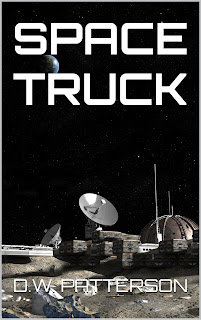My Cislunar Series of short stories grew out of a presentation I watched online. This series in the Remembered Earth Universe will be more near future. It will follow the development of Cislunar Space, that is the space between the Earth and the Moon (and slightly beyond). This space is becoming very important for business and military uses.
(Notes on the presentation by Dallas Bienhoff of Cislunar Development Corporation. Given at the Space Studies Institute, The Space Settlement Enterprise seminar in 2019).
Note that clicking all of these background short stories will be published here soon.
First:
“Tug” in LEO (Low-Earth-Orbit) to move (4000 kg) out to GEO (Geosynchronous-Earth-Orbit). Allows satellite owners to eliminate circularization of orbit and the fuel involved. Tug can be refueled in Earth orbit.
Story: US TUGS
Next:
Enough revenue to build fuel depot in Earth orbit. Water to LEO becomes rocket fuel (propellant) at depot.
Story: Proto Type
Next:
Additional tugs to move payload out to L1 (Lagrangian point one) and build a propellant depot. (25 tons, example payload).
Story: L1 OR BUST
Next:
LL (Lunar Lander) to depot to be based there. All supplies come from LEO in this scenario. Transfer of payloads and personnel from one vehicle to another.
Story: Guidance Box
Systems needed:
ETO – Earth to Orbit tanker.
Tugs – LEO & GEO
Next:
Aerobraking Tugs to save fuel.
Story: Air Brakes
Systems needed:
LEO fueling depot
40 – 80 tons water & 40 – 80 tons of propellant, twice amount needed for any mission
500 – 800 kWs of power, 5 to 8 times ISS
Allows monthly missions to L1 and quarterly missions to moon
Next:
EML1 (Earth-Moon-L1) aero-braking tug, 25 tons out, 5 tons back.
Story: View Point
Next:
EML1 fuel depot
70 – 100 tons capacity, sized to put 25 tons on moon
Water tanker to EML1
Story: Space Truck
Next:
LL to put 25 tons on moon's surface
Personnel module – 5 ton capacity
Story: Dark Side
Once propellant manufactured on moon, can then move 25 tons back to LLO (Low-Lunar-Orbit)
5 – 10% produced on moon can be delivered to LEO
General:
20 year life-span for vehicles
40 years to get complete architecture if done sequentially, could be sooner if some systems are done in parallel.





No comments:
Post a Comment